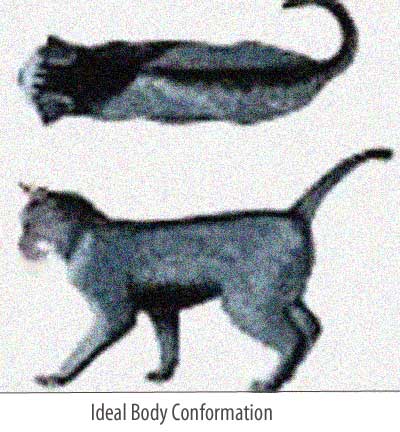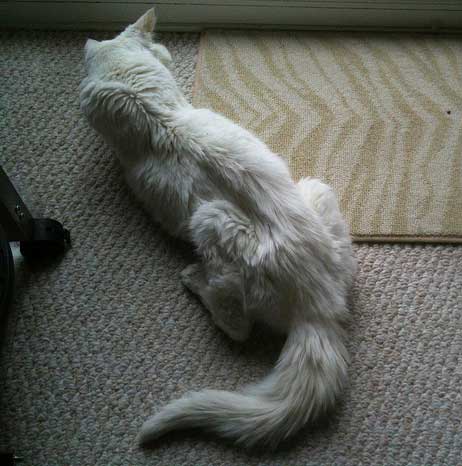Some people are visiting Google and searching for “my cat is always hungry”. They think their cat is always hungry. I will take a commonsense viewpoint on this problem. The first point that needs to be ticked off is the expectations of the human caregiver. How do they know that their cat is always hungry? Perhaps they expect their cat to eat a certain amount of food at certain times of the day but their cat demands more. They might, therefore, think that their cat is always hungry but perhaps they are under-feeding their cat? Perhaps they are feeding too little and not often enough so their cat has to continually ask.
I think that this page is about deciding between a health problem and a non-health problem causing a cat to be hungry all the time or asking for food all the time (a different scenario). Therefore, it might entail some cat health diagnosis which is a tricky thing to do. I have touched on this below but essentially when it comes to diagnosing illness cat caregivers should leave that task to their veterinarian.

Underfed? Hyperthyroidism?
If a cat is underfed, they should be skinny. A domestic cat who is underweight and always hungry may be underfed. The next reason is hyperthyroidism. The first signs of hyperthyroidism are described as ‘dramatic’ because the increase in thyroid hormones causes an increase in appetite. Where at one time a domestic cat was a picky eater, he is a voracious feeder, constantly on the search for food. This is combined with an increase in activity. Hyperthyroidism, as you might well know, is caused by cancer, thyroid cancer to be precise. And it affects older cats normally.
RELATED: Underweight Cats – being underweight is a very common symptom of illness because there is a loss of appetite.
One thing a cat caregiver can do under these circumstances is to carefully palpate (gently feel with the hands) the area under the chin when the head is lifted. This may reveal a small lump. This would indicate a thyroid tumour which may appear only on one side but they can be on both sides (bilateral). If this self-diagnosis results in a positive assessment, you must take your cat to a veterinarian for blood work to see if thyroid hormone levels are truly elevated.
A veterinarian will also check for kidney function as an increased metabolic rate may hide kidney failure. The heart will also be evaluated because it can be damaged from an increased metabolic rate. There may be high blood pressure or hypertension which is often evident in hypothyroid cats.
Overeating?
I’ve ticked two boxes. A third box to tick is whether your cat is genuinely overeating. Some cats can have a traumatic experience when they’re very young due to under-feeding. This may make them nervous about being without food. This in turn drives them to seek food when they don’t need it. A cat with this attitude (arguably a mental health condition) should be overweight if the caregiver accommodates their cat. How do you assess an overweight cat? The picture below is a quick check. One should take a commonsense approach. In general, people know when an animal or human is overweight or underweight.



Looking from above, a cat should have a slight waist just in front of the thighs. The body going forward should not be bulbous or expanded but fairly straight. You should be able to feel the rib cage when gently palpitating it. You can also feel the spine with gentle palpation. In fact, you may be able to feel the spine quite easily. A cat’s shoulder blades are always easy to feel in a cat that is of the correct weight.
If a healthy cat is overweight but continually hungry it indicates a desire to eat when they don’t need to eat either because of the reason stated above or perhaps they have been trained to eat too much. It is possible to get into bad habits with domestic cats. A human caregiver can set up rhythms and routines which lead to feeding. These routines can be driven by the cat. The cat trains the person. The person responds positively. It can be an upward spiral of eating leading to overeating. And there is sometimes a normalisation of excessive eating habits and excess weight. It has been proved that some cat caregivers see obesity as a normal weight. They might also regard overeating as normal eating. This complicates things.
I believe that sometimes, perhaps rarely, domestic cats indulge themselves with pleasure eating. If they are bored for whatever reason they may want to eat for pleasure just like people. I am convinced that this happens sometimes.
The thread running through these three possibilities is the cat’s weight. If the cat is underweight due to weight loss caused by hyperthyroidism and if there is vomiting and panting then you can diagnose hyperthyroidism after palpitating the chin as described above. If a healthy cat us underweight without signs of hyperthyroidism, underfeeding is a possibility.
Perhaps the starting point is the weight of the cat and then you diagnose the cause of being hungry from that starting point. BUT please see a vet if unsure.

